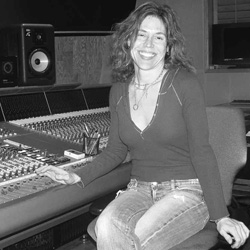
Does that truly mean that you can never fix it in the mix?
Well, I certainly can’t fix a terrible performance, and I can’t turn a bad singer into a great singer.
But I can take what’s given to me and create a really good blend of what’s been recorded.
I can take the vocal you give me and make it present and fat-sounding and I’ll place it right in the middle of the mix and put a great effect on it . . . but if it was awful to start with, it will still be awful, at least to my ears.
Blending is its own art form, and I can create a great blend of great sounds or of awful sounds; an out-of-tune guitar can easily be blended beautifully with an out-of-tune piano.
Get-ting a mix properly balanced is the key. The great mixers—the Lord-Alge brothers, the Jack Joseph Puigs, the Andy Wallaces—can get a great blend on anything.
Of course, you have to know what sounds good. If you don’t know anything about recorded sound, you can really mess up someone’s recording. Ultrasonic, where I first started working when I moved to New Orleans, didn’t have a bunch of gear.
They were like Stax Records in that everything in the studio was already set up and never broken down; the musicians just turned up and played.
I’d watch David Farrell, the engineer there, go out into the room and move a microphone an inch. I’d ask him what he was doing, and he’d say, “This will give me a little more punch.”
He didn’t do it with EQs; he’d just move the microphone around for a few minutes until he decided, “That’s the best I can record that drum with that mic through this channel on this day; now we’ve got to roll tape.”
But tastes change, and the records of today don’t sound like the records of 20 or even 10 years ago. How do you adapt to changing tastes?
Well, you’ve got to put a subwoofer in your car to begin with. [laughs] Seriously, you do, because 40 Hz exists now; it didn’t exist in the past in recorded music.
I mean, it existed physically, but nobody could hear it because the speakers of the era couldn’t reproduce it and in any event vinyl couldn’t hold it because the needle would jump out of the groove. So today you have to factor that in. We have real low end in today’s recordings, so you have to work with it.
It’s not all about low end, though. Today’s records tend to be surgically precise, and today’s vocals tend to be autotuned.
Not the records I make! [laughs] Mind you, I haven’t had any hit records for awhile. But I take pride in the fact that my records sound fantastic.
They are artistic, they are creative, and I refuse to use autotuning. I rarely will even cut to a click. I don’t make those kinds of records, and as a result I don’t make hit records.
But that’s okay, because I’m very happy with the records I do make. So I guess I’m a rogue, and sometimes I get work because of it, and sometimes I’m passed over because of it.
How do you balance the aesthetic demands of the artist with the commercial demands of the label that is financing the sessions?
Well, if I’m contacted by a major label to produce one of their signed artists, then my under-standing is that the artist and I have both agreed to play ball: we have to give them a single, and we have to allow them all kinds of comments on what we’re doing. As long as we’re all willing to play ball, then, fine, let’s go into the studio.
Actually, I prefer to work with indie people, where the label basically says, “Do whatever you want because we’re not giving you much money anyway and we’re going to be happy with whatever you give us.”
But either way, if there’s a major difference between the artist and the label, then ultimately we all have to sit down together and discuss what we’re going to do.
The deal is between the label and the artist, after all. I’m just a hired gun—an independent contractor who is brought in to make a record. There’s no way for me to side with a label over an artist—I could never do that—but there’s also no way for me to ignore a label that is paying for the sessions and owns the masters.
The artist needs to realize that they have to come to an understanding with the label, because if they don’t, the label will simply shelve your record so it never comes out, but they will still own your masters. In short, you’re going to be fucked.
They have that power, and they will do that to you in a heartbeat, so you have to ask yourself if you really want to get into a battle with them. The best way is to come to a peaceful resolution by talking things through.
